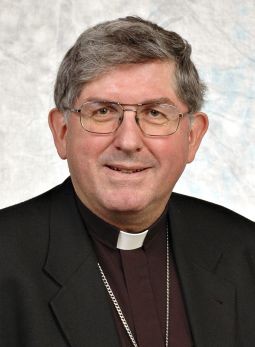By Steve Weatherbe
National Catholic Register
June 14, 2010
http://www.ncregister.com/register_exclusives/off_to_ireland/
 |
| Archbishop Thomas Collins of Toronto has been named by Pope Benedict XVI to lead the visitation of the Archdiocese of Cashel, Ireland. Archbishop Collins is pictured in a 2006 photo. |
Archbishop Thomas Collins of Toronto is one of nine Church leaders named by the Holy See as “visitors” to Irish dioceses. Along with Cardinal Sean O’Malley of Boston and Archbishop Timothy Dolan of New York, they are charged with reporting on their response to the sexual-abuse scandal. Archbishop Collins will be visiting the Irish Diocese of Cashel.
Register correspondent Steve Weatherbe, who recently interviewed another member of the team, Ottawa Archbishop Terrence Prendergast, spoke with Archbishop Collins by phone on June 11.
What is your assignment?
I think from the very preliminary information, at this very early stage, that we want to look and see what has happened, and what we can learn for the future. I think what usually happens is that, basically, you look at the past, the present and the future: what has happened, what are the reasons for things, what is the effect presently on the Church, its life.
A real point of this would be also to help the Church to advance forward and be spiritually renewed. That would involve some recommendations involving better ways of doing things.
Who will you be meeting and talking to?
I would assume it would be the bishop, the vicar general, the priests, anyone who wishes to talk. I think what usually happens in these visitations is that, first of all, there is a kind of a notification, information, usually a questionnaire. A visit is essential, maybe more than one, and then it is a question of setting up appointments and letting people know that I am there, and seeing key people in the life of the diocese.
Will you be meeting members of the public, victims or their representatives?
I would presume so. I don’t know the exact process. I would assume anyone who wanted to meet with the visitor would do so.
What sort of challenges do you anticipate?
I think the challenge is to try to truly understand the situation and to do it with as much clarity and commitment (as we can) to the goal of helping the Church and helping the people in the diocese and the larger Church. So the key is to truly see what is there, and that is always a difficult thing to do, but to listen attentively and to say what is truly here and be as objective and as fair as possible in trying to see what is the most fruitful path ahead.
What comment do you make when you encounter skepticism from those who might say something like — and I get this phrase from Archbishop Prendergast of Ottawa — ‘this is just more clergy investigating more clergy’?
Well, skepticism and cynicism are there in our world. You can’t do anything about that. All you can do is honestly look into the situation and do the best one can. Some people will never be convinced that you are acting with good motives or intentions. But I often find cynicism is a secure refuge in some ways, but it is not a very life-giving one. And it does not provide, really, a greater insight into the truth. If one assumes the worst of motives, what can one do but try to do one’s best? What with original sin in the world, there are all kinds of failures among all kinds of people. To be cynical is to recognize all that. But that’s not the only reality. It’s there because of human weakness. But it’s not the true reality. Another part of the human condition is people honestly trying to do the right thing. Cynicism doesn’t give you greater light. It might blind a person to people earnestly trying to do the right thing.
Why do you think you were chosen?
I don’t have a real idea of that, but you have [Bishops] Murphy, O’Connor, Dolan, Prendergast, O’Malley and Collins, it seems they have chosen bishops who have experience in the Church but who are Irish in background but who are not from Ireland but are from the diaspora.
How far are you from your Irish roots?
Well, I’ve only visited Ireland once, and that was in 2008. I went to Drogheda; I took a bus. I still apparently have relatives there. It was 1827 when my family came out from there.
I don’t know if you’ve seen the Timemagazine cover story “Why Being Pope Means Never Having to Say You’re Sorry.”
I saw the cover, but I didn’t read the story.
It turned you off?
Well, I mean, I don’t know why! These attacks on the Pope are just very, very unfair. He is really diligently, clearly, earnestly trying to be sure that any problems that have arisen, any problems within the priesthood — that they are dealt with clearly and effectively. He’s led the way. He’s just extraordinary. The Pope is the head of the Church, so people want to criticize him. Pope Benedict is just exceptional and utterly committed to ensuring the priesthood is what it should be when people are very negative. The priests are called to holiness. That is the standard. That is what the Holy Father is presenting that priests should be. And when in the course of time, through all kinds of human weakness, that is not what people have found, and priests have done things that have caused terrible suffering, then this must be addressed. And this is what the Holy Father is doing.
Any original material on these pages is copyright © BishopAccountability.org 2004. Reproduce freely with attribution.